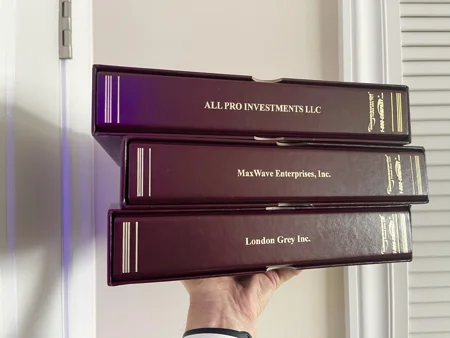Let’s talk about the single member LLC and asset protection.
A lot of people online say that single member limited liability companies (SMLLCs) don’t give you any protection. More specifically, they say you don’t have what they call “charging order protection.”
What Is LLC Charging Order Protection?
Okay, say your LLC is a brick wall. You are one one side, your personal life. On the other side of the brick wall are your business assets, your business life.
So someone sues your business, your LLC. The lawsuit stays inside of the LLC. Thus, the LLC protects you from losing your personal assets when properly structured and operated in the right jurisdiction.
On the other hand, say someone sues you personally, charging order protection can prevent them from seizing your LLC or anything that it owns.

Real Estate and the Single Member LLC
Say your LLC owns a building in Los Angeles or Miami that pays you $36,000 a year in positive cash flow. Say you rear end someone’s car and they sue you for more than your insurance coverage (a daily event, by the way). You get a $400,000 judgment against yourself.
What can they take?
Say they take your car, seize the house that you live in (depending on your state), and empty your bank account.
But what about your LLC?
There is a lot of chatter on the internet that if it is a single member LLC they can run off and take your LLC away from you. Your LLC owns a building. So, that could be $1 million in equity sitting in that building that they could grab. Thus, they say that someone will just prance over there and take your LLC away from you. This is called a foreclosure action against your interest in the single member LLC.

Why Form a Single Member LLC?
So, why did we form the LLC to begin with? To protect our assets from lawsuits. So if someone sues your business, the lawsuit doesn’t jump over into your personal life. That is, whatever bad thing happens on the other side of the brick wall, the bad things stay over there and don’t affect you and your family.

LLC Charging Order Protection
So, if someone says your single member LLC doesn’t have charging order protection they may be right. It really depends on the state you’re in. Some states, such as Wyoming (our favorite in the US). In addition, Nevada, Delaware, South Dakota and Alaska also have laws that do provide single-member LLC charging order protection. Even stronger than Wyoming is an offshore LLC in the Caribbean Island of Nevis, (KNEE-vihs). More about that later.
But first, how does a charging order work? Say you live in Florida or California. A judge puts a charging order on your interest (that is your portion of ownership) in an LLC. He’s saying this. Let’s say you take that $36,000 out of the LLC and take it as a distribution. If so, you have to actually pay that money to your creditor until the $400,000 judgment is paid off.
But…your creditor can’t take the property away.
It gets even better. They can’t make you take the $36,000 a year out of the LLC. So, you just leave it in the LLC and your creditor gets nothing.
Okay, want even better?
Let’s look at revenue ruling 77-137. It says that since your credit or has the right to receive the $36,000 per year, they have to pay the taxes on that money. That is, ahem, they have to pay the taxes whether they receive it or not. You read that right. The money stays inside of your LLC but your judgment creditor has to pay your taxes.
So, instead of paying the money out of the LLC as a distribution to members, you do this:
- You just borrow that same money from the LLC. That is you take out a loan from the LLC.
- On the other hand, you can pay yourself a salary out of the LLC. You do this especially in a state that does not allow wage garnishment.
Neither of these amount to a distribution to members. Your creditor is going to blow a fuse but there is little if anything they can do about it.

LLC Charging Order Laws Vary by State
The problem is that in some states, if the creditor doesn’t get paid on the charging order, they can foreclose on the LLC. So the judge can say, here Mr. Creditor…the LLC is yours now. So, they sell your former building and get paid.
But what about this single member / multi-member LLC stuff? In most states, you need to have more than one member of an LLC in order to have charging order protection. But in I think about 17 states you own ¼ of an LLC and there are 3 other members. The state law allows a creditor to foreclose on your ¼ interest in the LLC. So, they foreclose on your interest in the LLC and not the other people’s. As such, in this case, having a multi-member LLC won’t give you much more protection than a single member LLC if the state provides for foreclosure in their LLC laws.
So, all this chatter about a multi-member LLC on the Internet in order to have charging order protection may just be hogwash. It really depends on the state.
So, you really want to make sure that the state law reads that a charging order is, as they say, the exclusive remedy that your creditor has against your interest in the LLC.

State by State LLC Charging Order Statutes
NOTE: This information was believed to be accurate at the time of publishing. However, we make no warranties or guarantees as to the accuracy . If you are aware of updated information to the above, please notify us. Consult with licensed attorney in your state prior to acting on the information herein.
| State | Statute | Creditor Remedy |
| Alabama | §10A-5A-5.03 | Charging Order Exclusive |
| Alaska | §10.50.380 | Charging Order Exclusive |
| Arizona | §29-655 | Charging Order Exclusive |
| Arkansas | §4-32-705 | Charging Order |
| California | §17705.03 | Charging Order and Foreclosure |
| Colorado | §7-80-703 | Charging Order and Foreclosure |
| Connecticut | §34-259b | Charging Order Exclusive Remedy |
| Delaware | §18-703 | Charging Order Exclusive Remedy |
| District of Columbia | §29-805.03 | Charging Order and Foreclosure |
| Florida | §605.0503 | Single-Member: Charging Order and Foreclosure Multi-Member: Charging Order Exclusive Remedy |
| Georgia | §14-11-504 | Charging Order and Garnishment |
| Hawaii | §428-504 | Charging Order and Foreclosure |
| Idaho | §30-25-503 | Charging Order and Foreclosure |
| Illinois | §180/30-20 | Charging Order and Foreclosure |
| Indiana | §IC-23-18-6-7 | Charging Order |
| Iowa | §489.503 | Charging Order and Foreclosure |
| Kansas | §17-76-113 | Charging Order Exclusive |
| Kentucky | §275.260 | Charging Order and Foreclosure |
| Louisiana | La. R.S. 12:1331 | Charging Order |
| Maine | 31§1573 | Charging Order Exclusive |
| Maryland | §4A-607 | Charging Order and Foreclosure |
| Massachusetts | §XXII-156C-40 | Charging Order |
| Michigan | §450.4507 | Charging Order Exclusive |
| Minnesota | §322C.0503 | Charging Order and Foreclosure |
| Mississippi | §79-29-705 | Charging Order Exclusive Remedy |
| Missouri | §347.119 | Charging Order |
| Montana | §35-8-705 | Charging Order and Foreclosure |
| Nebraska | §21-142 | Charging Order and Foreclosure |
| Nevada | §86.401 | Charging Order Exclusive |
| New Hampshire | §304-C:126 | Single-Member: Charging Order and Foreclosure Multi-Member: Charging Order Exclusive Remedy |
| New Jersey | §42:2C-43 | Charging Order |
| New Mexico | §53-19-35 | Charging Order |
| New York | LLC L§607 | Charging Order |
| North Carolina | §57D-5-03 | Charging Order Exclusive Remedy |
| North Dakota | §10-32.1-45 | Charging Order Exclusive |
| Ohio | §1705.19 | Charging Order Exclusive Remedy |
| Oklahoma | §18-441-605 | Charging Order and Foreclosure |
| Oregon | §63.259 | Charging Order |
| Pennsylvania | §8853 | Charging Order and Foreclosure |
| Rhode Island | §7-16-37 | Charging Order |
| South Carolina | §33-44-504 | Charging Order and Foreclosure |
| South Dakota | §47-34A-504 | Charging Order |
| Tennessee | §48-218-105 | Charging Order Exclusive |
| Texas | §3-101.112 | Charging Order Exclusive Remedy |
| Utah | §48-3a-503 | Charging Order and Foreclosure |
| Vermont | 11 V.S.A §4074 | Charging Order and Foreclosure |
| Virginia | §13.1-1041.1 | Charging Order Exclusive Remedy |
| Washington | §25.15.256 | Charging Order and Foreclosure |
| West Virginia | §31B-5-504 | Charging Order and Foreclosure |
| Wisconsin | §183.0705 | Charging Order |
| Wyoming | §17-29-503 | Charging Order Exclusive |
NOTE: This information was believed to be accurate at the time of publishing. However, we make no warranties or guarantees as to the accuracy . If you are aware of updated information to the above, please notify us. Consult with licensed attorney in your state prior to acting on the information herein.

Single Member LLC Holding Company
So, what do we do?
You create a holding company.
That is, we set up one LLC with strong asset protection laws that owns all of your other LLCs. What that means is this. For your properties in states with weak asset protection, you can still use local LLCs. The local LLC can hold property because of the lawsuit protection it can give. So, remember the brick wall,. If your business is sued your local LLC can protect your personal assets from the business lawsuit.
But when someone sues you personally; that is when we need asset protection. You do this so somebody doesn’t sue you and take your companies away from you and the properties that they own.
So, to repeat, we set up an LLC that owns your other LLCs. You set it up in a place with strong LLC asset protection laws such as Wyoming, or our favorite, the Caribbean island Nevis.
Your holding company LLC owns your other LLCs. However, you don’t necessarily have your Wyoming or Nevis LLC own the property. This is because an LLC operating, that is, owning property there, will likely be subject to local statutes. Instead, we set up LLCs for you where the property is located. We set up the holding company in Wyoming or Nevis LLC. These LLCs don’t operate in the states with weak LLC statutes. Instead, they own your other LLCs.
Then, BOOM, your single member LLC owns your LLCs in the states that allow foreclosure on your interest in an LLC. So your holding company can protect all of rest of the LLCs from lawsuits against you personally. That is because you don’t own the local LLCs. Instead, your out of state LLC owns your local LLCs.

The Benefits of a Wyoming or Nevis LLC
So, in Florida, California and about 43 other states (45 states total) there is no charging order protection for single member LLCs. On the other hand, the Wyoming and Nevis statutes specifically spell it out. In those jurisdictions, even a single member LLCs have charging order protection.
So, people with “internet law degrees” tell you they need to have multi-member LLCs in order to have charging order protection. That may not be true. Know the statutes of your state. But the key thing is if we set up a Wyoming or Nevis LLC for you, not only can you have more privacy because of the following:
- You can honestly say you don’t own the LLC that owns the property (your Wyoming or Nevis LLC owns it).
- More importantly, you know what happens when someone sues you personally. You don’t have to be so worried about that person taking your company away and the property that it owns.
This is true even if it is a single member LLC where you are the only owner. This is because your holding company LLC that owns your other LLCs is a Wyoming or Nevis LLC. Additionally, we can provide you with an address with mail forwarding in Wyoming or Nevis and nominee service to keep your name out of the public records.
Conclusion
If you want to set up an LLC or have more questions, please give us a call at +1-661-310-2931. You can call anytime 24 hours per day or visit fill out a free consultation form above.



